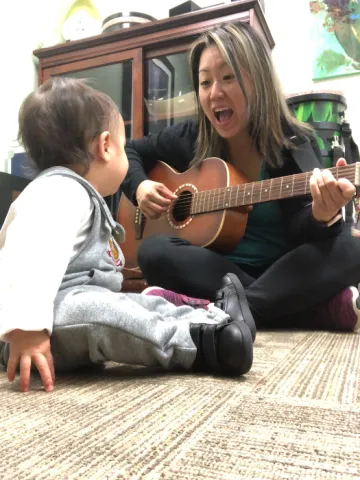
Sheila Lee Brings Joy and Healing Through Music Therapy

Sheila Lee didn’t initially set out to be a music therapist. In fact, she hadn’t even heard of the profession until a classmate at the University of British Columbia casually suggested it to her. At the time, she was studying psychology with the goal of becoming a social worker or counsellor. But the idea stuck. She enrolled in Capilano University’s Music Therapy program, saw the way music could break through where words failed, and realized she had found her path.
“Music therapy brought together everything I loved: psychology, counselling, music, even biology,” Sheila says. “It felt like the right fit.”
Now, as a certified music therapist at BC Children’s Hospital (BCCH), Sheila helps kids and families navigate the challenges of hospitalization through music.
“In the hospital, kids don’t get a lot of choice,” she explains. “They have to get a needle poke, they have to undergo a procedure, they’re not allowed to eat before surgery. But in music therapy, they get to make decisions. That sense of control can help reduce anxiety.”
A session with Sheila can take on many forms. Some kids want to strum a guitar or pound on a drum, while others prefer to sing, move to music, or even create their own beats on a DJ machine. It’s not just about playing music—it’s also an outlet for expression, connection, and comfort.
Sheila remembers a young child who had been withdrawn and scared throughout her hospital stay. While she was eventually discharged, this young girl later had to come back to the hospital. When she returned, she had one request for her mother: “Mom, can I go see the music lady again?” It was a simple moment, but a powerful reminder of how deeply music therapy impacts children, even when they don’t express it in the moment.
Music has been a part of Sheila’s life since she was a child. “My older sister started piano lessons when she was five, and I’d tag along to her lessons,” she says. “By the time I started my own lessons at five, my teacher realized I had already picked up so much just from listening.” From there, she never stopped learning: picking up guitar, violin, flute, percussion, and even the fiddle along the way.
Her deep connection to music has helped her relate to the kids she works with, especially those who might not otherwise open up. “Not everyone wants to talk about what they’re going through,” she says. “Sometimes it’s easier to just play, or listen, or create something together.”
Despite its clear benefits, music therapy remains underfunded and often misunderstood. “There are so many hospital units, but only a handful of music therapists, and most of us work part-time,” Sheila says. “At BCCH we have a music studio here full of all kinds of instruments, but without a music therapist, they are left unused. It’s really frustrating that there’s not more of us.”
She hopes that will change in the future. As awareness grows, she wants more people to recognize music is an essential part of health care.
“People think of music therapy as fun, and it is! But we’re also there to support physical, mental, and spiritual health,” Sheila says. “Playing the drum kit can help improve coordination, memory, and attention. Some kids are not able to talk for a variety of reasons, maybe English is not their first language, but people still need to find a way to communicate. Music is a way to express themselves and cope with trauma, anxiety, and stress.”
With Music Therapy Awareness Month in full swing, there’s no better time to spotlight the work of therapists like Sheila. Music has the power to reach people when nothing else can. Whether it’s a teenager mixing beats on a machine or a child playing their favourite Taylor Swift song, those moments remind children that they have a voice.